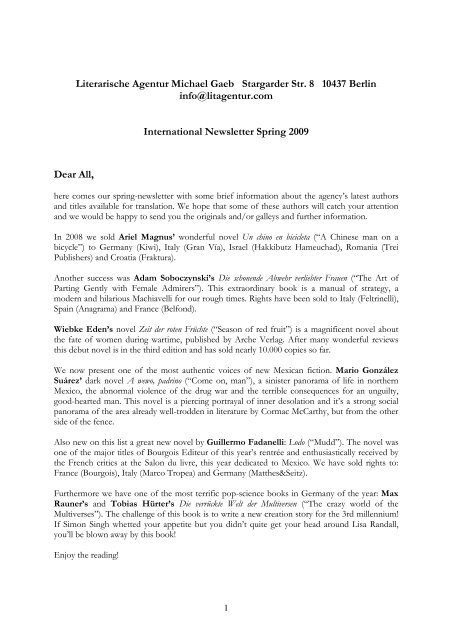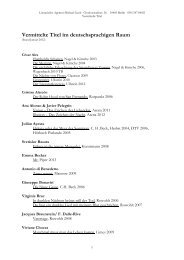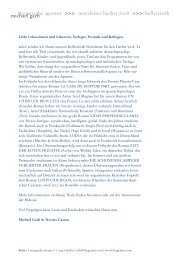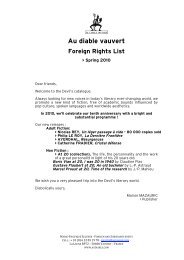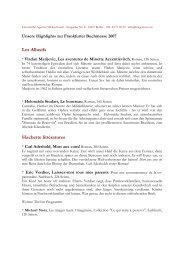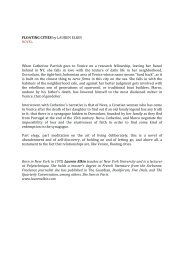Literarische Agentur Michael Gaeb Stargarder Str. 8 10437 Berlin ...
Literarische Agentur Michael Gaeb Stargarder Str. 8 10437 Berlin ...
Literarische Agentur Michael Gaeb Stargarder Str. 8 10437 Berlin ...
You also want an ePaper? Increase the reach of your titles
YUMPU automatically turns print PDFs into web optimized ePapers that Google loves.
Dear All,<br />
<strong>Literarische</strong> <strong>Agentur</strong> <strong>Michael</strong> <strong>Gaeb</strong> <strong>Stargarder</strong> <strong>Str</strong>. 8 <strong>10437</strong> <strong>Berlin</strong><br />
info@litagentur.com<br />
International Newsletter Spring 2009<br />
here comes our spring-newsletter with some brief information about the agency’s latest authors<br />
and titles available for translation. We hope that some of these authors will catch your attention<br />
and we would be happy to send you the originals and/or galleys and further information.<br />
In 2008 we sold Ariel Magnus’ wonderful novel Un chino en bicicleta (“A Chinese man on a<br />
bicycle”) to Germany (Kiwi), Italy (Gran Vía), Israel (Hakkibutz Hameuchad), Romania (Trei<br />
Publishers) and Croatia (Fraktura).<br />
Another success was Adam Soboczynski’s Die schonende Abwehr verliebter Frauen (“The Art of<br />
Parting Gently with Female Admirers”). This extraordinary book is a manual of strategy, a<br />
modern and hilarious Machiavelli for our rough times. Rights have been sold to Italy (Feltrinelli),<br />
Spain (Anagrama) and France (Belfond).<br />
Wiebke Eden’s novel Zeit der roten Früchte (“Season of red fruit”) is a magnificent novel about<br />
the fate of women during wartime, published by Arche Verlag. After many wonderful reviews<br />
this debut novel is in the third edition and has sold nearly 10.000 copies so far.<br />
We now present one of the most authentic voices of new Mexican fiction. Mario González<br />
Suárez’ dark novel A wewo, padrino (“Come on, man”), a sinister panorama of life in northern<br />
Mexico, the abnormal violence of the drug war and the terrible consequences for an unguilty,<br />
good-hearted man. This novel is a piercing portrayal of inner desolation and it’s a strong social<br />
panorama of the area already well-trodden in literature by Cormac McCarthy, but from the other<br />
side of the fence.<br />
Also new on this list a great new novel by Guillermo Fadanelli: Lodo (“Mudd”). The novel was<br />
one of the major titles of Bourgois Editeur of this year’s rentrée and enthusiastically received by<br />
the French critics at the Salon du livre, this year dedicated to Mexico. We have sold rights to:<br />
France (Bourgois), Italy (Marco Tropea) and Germany (Matthes&Seitz).<br />
Furthermore we have one of the most terrific pop-science books in Germany of the year: Max<br />
Rauner’s and Tobias Hürter’s Die verrückte Welt der Multiversen (“The crazy world of the<br />
Multiverses”). The challenge of this book is to write a new creation story for the 3rd millennium!<br />
If Simon Singh whetted your appetite but you didn’t quite get your head around Lisa Randall,<br />
you’ll be blown away by this book!<br />
Enjoy the reading!<br />
1
Fiction<br />
The second novel of Mario González Suárez, one of the great authentic voices of Mexican<br />
fiction today, throws us into the violent world of drug trafficking in northern Mexico. The<br />
protagonist of this first-class novel called A wewo, padrino, published recently by Mondadori, is<br />
a good man at heart, he is forced to commit a crime against his will. The simple taxi driver,<br />
headed north with his wife, stumbles into an old school friend, Jaime Cuéllar. Cuéllar now heads<br />
one of the major drug cartels in the north. Against his will, the narrator gets sucked into a spiral<br />
of violence and crime. He ends up killing everyone close to him, leaving only a future of crime<br />
ahead of him. The novel is set in north Mexico, an area where stories of abnormal brutality often<br />
steal the international headlines. Murders, drug dealing, human and organ trafficking are daily<br />
occurrences in this closely-guarded border area between the third and the first world.<br />
González Suárez’ novel is a piercing portrayal of inner desolation and it’s a strong social<br />
panorama of the area already well-trodden in literature by Cormac McCarthy, but from the other<br />
side of the fence.<br />
Ariel Magnus, winner of two prestigious literary prizes, is considered the shooting star of<br />
Argentinian fiction. Un chino en bicicleta (“A Chinese man on a bicycle”), Norma Editorial, is<br />
an utterly comic novel, that introduces the reader to the miraculous world of Chinese piracy, to<br />
Absurdistan in Buenos Aires. It’s one of the funniest romantic comedies of its time. The whole<br />
town is looking for a mysterious arsonist called “el Fosforito” (the little match), who is said<br />
always to escape the scene of the crime by bicycle – after all, he is Chinese. When Li is finally<br />
caught, he takes a hostage: Ramiro, the narrator of this novel. He carries him off to Buenos Aires’<br />
Chinatown, and the two become friends. Ramiro is more and more enchanted by his kidnappers<br />
and their surroundings, where he does not understand a word, but is having the greatest sex of<br />
his life. Move over magic realism. Magic capitalism is on the up. The novel was awarded the<br />
Premio La otra orilla. For fans of Woody Allen and <strong>Michael</strong> Chabon.<br />
Sold to: Germany (Kiwi), Israel (Hakkibutz Hameuchad), Croatia (Fraktura) and Romania (Trei)<br />
Bolaño 2.0! One of the major and most ambitious literary voices of Latin American fiction is<br />
Álvaro Enrigue. His new masterpiece Vidas perpendiculares ("Perpendicular lives"), published<br />
by Editorial Anagrama, tells the life story of Jerónimo Loera, a young boy from Mexico in the<br />
thirties. Everybody knows him on account of his protruding eyes and his strange appearance.<br />
And everybody thinks he’s mad. But he’s exactly the opposite. He lives many lives simultaneously<br />
and can remember his previous existences. He takes the reader back to the Middle Ages, back to<br />
Judea in the days of the Roman Empire and to Naples in the baroque period. But the thread of<br />
the tale is his current existence in sway between the Mexican wasteland and the American Dream.<br />
Magic realism revisited!<br />
For Fans of David Foster Wallace and Roberto Bolaño.<br />
Álvaro Enrigue, 38 years old, lives in Mexico and collaborates in different magazines. He was<br />
selected among the best 39 authors younger than 39 years by last year’s Bogota Festival.<br />
Sold to: France (Gallimard)<br />
We’ve also taken over one of the living classics of Argentinian fiction: Antonio Dal Masetto.<br />
Dal Masetto’s works, translated into various languages are an example of the good combination<br />
of great storytelling and great literary ambition. In one of his darkest and best-known novels<br />
Siempre es difícil volver a casa (“It’s hard to be home again”) Dal Masetto tells the story of four men<br />
2
who arrive at a silent village. They’re destitute and keep a low profile. However, they have a plan:<br />
they are going to rob a bank. But the robbery fails and the two burglars get trapped. The village is<br />
surrounded by the residents who club together to chase the robbers. In the end it turns out to be<br />
the most distinguished citizen who turns most criminal. There is little time left to the robbers.<br />
This novel is a dark crime novel that takes place in the burning heat of South America, and a<br />
captivating, sometimes utterly comic tale about greediness, despair and the human abyss.<br />
Sold to: France (Seuil), Germany (Rotpunkt, Suhrkamp), Italy (Einaudi) and Portugal<br />
(Livrododia)<br />
Dal Masetto’s recent novel Sacrificios en dias santos (“Holy sacrifices”) a group of girls<br />
witness an act of sodomy from their boarding school window. The story does the rounds of their<br />
small town in the Argentine pampas. A staunchly religious retired teacher rallies a protest against<br />
the offender, the local roof tiler, who will feel the full weight of the law. Meanwhile the 15-yearold<br />
Lucrecia is trying to lose her virginity in an act of rebellion against her strict, Catholic parents.<br />
Antonio Dal Masetto’s style is simple, yet vividly portrays a spectacle of collective violence and<br />
religious hypocrisy.<br />
Sold to: Italy (La Nuova Frontiera)<br />
One of the most successful German debut novels in 2008 was Wiebke Eden’s novel Zeit der<br />
roten Früchte (“Season of red fruit”), published by Arche Verlag.<br />
Stettin, Summer 1939. Greta is pregnant. She’s 19 years old and unmarried. And she refuses to<br />
marry the father of her child, as custom would have it. Ignoring the gossip as well as her<br />
disapproving family, she goes off smoking, drinking, flirting with labourers at harvest festivals<br />
and sitting in dockside bars, where all other women are prostitutes. She does not feel bonded to<br />
her baby, which she has left to her mother. The only one on her side is her father, but he’s drawn<br />
in by the military. Still, she throws herself at complete strangers or tramples aimlessly through the<br />
fields, desperately searching for love. As the war draws to a close, she’s picked up by some Polish<br />
soldiers and thrown into prison. When she reappears, horribly abused, her mother, father and<br />
daughter are gone. Only Edgar is still waiting for her. A magnificent novel about the fate of<br />
women during wartime. The book was one of the best sold literary debuts in Germany in 2009, in<br />
six months it has sold nearly 10.000 copies.<br />
Sold to: Poland (Arkadia)<br />
In November 2008 Anagrama launched the new novel by Guillermo Fadanelli, Lodo (“Mudd”).<br />
What happens when a gorgeous twenty-year-old girl, who has just committed a crime, seeks<br />
protection by an aging professor who is teaching philosophy? He throws his morals over board<br />
and starts on his ultimate road trip. One night Eduarda, a chick from the supermarket around the<br />
corner, knocks on Benito Torrentera’s door and makes herself comfortable. The professor, single<br />
and turning fifty soon, receives her with great pleasure, however she only sells her body. She has<br />
robbed the local supermarket and accidentally killed someone. Now it’s up to Torrentera to<br />
protect her from the law. Soon he turns just as odious as his corrupt brother. He manipulates<br />
Eduarda’s identity and takes her to the north of Mexico. But there are male competitors all along<br />
the way. In spite of the deal made between the criminal couple, the philosopher, who tells his<br />
story retrospectively from prison, becomes violently jealous and finally murders two men. But<br />
fate has another surprise in store for him. A sarcastic comment on self justice and corruption –<br />
made by a disillusioned moralist and a ‘dying animal’.<br />
Sold to: France (Bourgois), Germany (Matthes&Seitz <strong>Berlin</strong>), Italy (Marco Tropea)<br />
3
Non-fiction<br />
Life is not easy today – neither for men nor for women. Be it at the workplace, in friendship or in<br />
love affairs: the latter is full of baseness, jealousy and intrigues. Die schonende Abwehr<br />
verliebter Frauen (“The Art Of Parting Gently With Female Admirers”), published by<br />
G.Kiepenheuer, the recent book of Adam Soboczynski, one of the most acclaimed young<br />
journalists in Germany, is a guideline of strategies on how to handle our fellow citizens, an elegant<br />
Machiavelli for our times. Soboczynski takes familiar situations from modern everyday life, where<br />
moral and immoral behaviour get muddled by self-interest. Sometimes it may be beneficial to<br />
appear slightly hurt, while at other times showing outrage at the cruelness of the world puts us in a<br />
heroic light. With great sympathy for the weaknesses of his protagonists, the author portrays men<br />
and women struggling through a civilized jungle, and provides the reader with all necessary<br />
techniques in order to survive. And in order to unmask all others. More than telling a story, this<br />
book evolves around an idea. It is written in an ironic and playful style, full of wit and charm. It<br />
teaches a still blue-eyed species the high art of dissimulation and the narrator proves himself to be<br />
the greatest master of his kind.<br />
Sold to: Italy (Feltrinelli), Spain (Anagrama), France (Belfond)<br />
One of the major pop-science books of the year in Germany is Max Rauner’s and Tobias<br />
Hürter’s The Crazy Theory of the Multiverses, published by Piper Verlag. The authors, both<br />
with PhDs in physics and philosophy, are editors at important German popular science<br />
magazines. The challenge of this book is to write a new creation story for the 3rd millennium!<br />
A groundbreaking idea has seized the scientific world. Could our universe be just one of many?<br />
Could we be living in many different worlds at the same time, as replicas of ourselves? This<br />
multiple universe theory is starting to take root in modern cosmology. Britain’s Astronomer<br />
Royal, Sir Martin Rees would bet his dog’s life on its existence. The cosmologist Andrei Linde<br />
from Stanford University would bet his own life. This book reveals the latest on this scientific<br />
revolution. Since Nicolaus Copernicus declared that earth was not the centre of the universe,<br />
man lost his privileged position in the cosmos. In this book , the authors, Tobias Hürter and Max<br />
Rauner, spoke to Nobel laureates, papal astronomers, philosophers and the most prominent<br />
defenders and opponents of this new world theory. They explain the theory of multiple universes<br />
and ponder what it would mean for us, if there really were multiple replicas of ourselves. They go<br />
in search of the roots of the image of the multiple universe in literature, philosophy and religion.<br />
Here the third millennium gets its own creation theory.<br />
If Simon Singh whetted your appetite but you didn’t quite get your head around Lisa<br />
Randall, you’ll be blown away by this book!<br />
4


